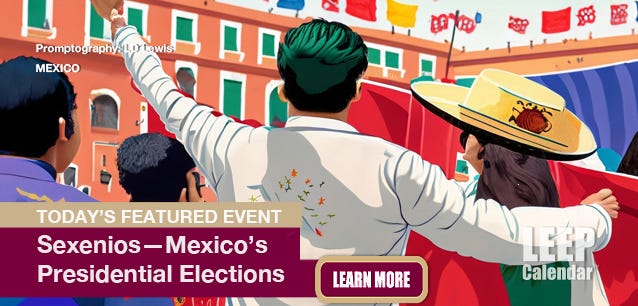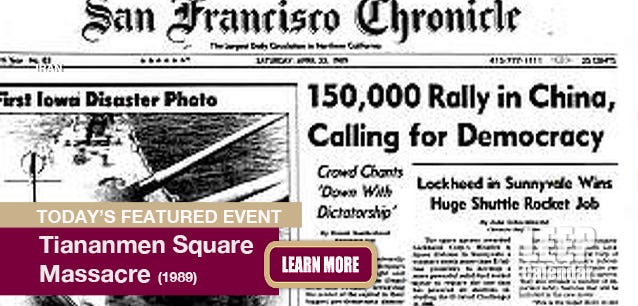 AD
AD

June 2024 Gems
June's Gems
Welcome to June. School is out, fun is in, and business tends to slow down for the next three months. Another June theme is children and keeping them engaged, learning and growing.
The solstice on the 20th marks the onset of summer (Northern Hemisphere) or winter (Southern Hemisphere). Many people, particularly in Europe, North America and Asia, will be embarking on holidays, meaning tourism is a major theme.
Thanks for reading LD Lewis—LEEP Ink Newsletter of Events! Subscribe for free to receive new posts and support my work.
The European Union will be voting on its next leadership June 6-9.
Festivals, fairs and concert events dominate throughout the Northern Hemisphere.
Additional themes for June include Pride Month, with multiple days and festivities worldwide to celebrate LGBTQ+ lifestyle, culture and accomplishments.
It's International Men's Month, which embraces men, fatherhood and their health and societal needs. In the United States, Caribbean-American Heritage Month and Immigrant Heritage Month bring attention to two important demographics. Elsewhere, in Canada and several other nations, the focus is on Indigenous peopleand their history.
With Juneteenth on the 19th, the new federal holiday in the United States recognizing the official end of slavery, several organizations have dubbed June African American Appreciation Month and African American Music Month.
For more events, check out my June 2022 and June 2023 editions.
Since this is the year of elections, with 40% of the world's nations electing new leaders, let's start with the presidential circus in Mexico, also known as El Sexenios(every six years) or the Presidential Election.
Mexico chooses a President every six years—promptography LD Lewis.
EL SEXENIOS
Date: June 2, 2024
Location: Mexico
Champion: Instituto Nacional Electoral
On June 2, 2024, Mexicans will go to the polls to elect their next President. Mexico's Presidential Elections, or "sexenios," are an essential aspect of the country's political system, which began with the creation of the 1917 Constitution following the Mexican Revolution. Over time, various political parties have shaped Mexican politics.
The primary political parties in Mexico are:
-
Institutional Revolutionary Party (PRI): Historically dominant in Mexican politics, the PRI governed Mexico for 71 consecutive years until 2000 and is considered centrist.
-
National Action Party (PAN): A center-right party, PAN has been a significant force in Mexican politics. It promotes pro-business policies and conservative social values.
-
Party of the Democratic Revolution (PRD): A center-left party, the PRD has historically championed social justice and progressive policies.
-
MORENA (National Regeneration Movement): Founded in 2014 by President Andrés Manuel López Obrador, MORENA is a left-wing party that has become increasingly influential.
One unique aspect of Mexican presidential elections is that re-election is not allowed. Once a president's six-year term ends, he or she cannot run for the presidency again.
Earning a James Beard Award is extremely prestigious in the restaurant industry—photo CottonBro
James Beard Awards Presentation
Date: June 10, 2024
Location: United States
Champion: James Beard Foundations
Foodies rejoice! The James Beard Awards will be presented on June 10 to this year's winners. Established in 1990, the James Beard Awards are among the nation’s most prestigious honors recognizing leaders in the culinary and food media industries. The award recognizes exceptional talent and achievement in the culinary arts, hospitality, media, and broader food system, as well as a demonstrated commitment to racial and gender equity, community, sustainability, and a culture where all can thrive.
The Awards Committee oversees each awards program (Books, Broadcast Media, Journalism, Leadership, and Restaurant and Chef). Subcommittee members volunteer their time to manage the policies, procedures, and selection of judges for their respective programs.
All James Beard Award winners receive a certificate and a medallion engraved with the James Beard Foundation Awards insignia.
24 Hours of Le Mans is one of the most prestigious car races in the world.
24 HOURS OF LE MANS
Date: June 12-16, 2024
Location: France
Champion: Automobile Club de l'Ouest
The 24 Hours of Le Mans in France is part of the Triple Crown of Motorsports, which includes the Indianapolis 500 and the Monaco Grand Prix.
Initiated in 1923, Le Mans is the longest-running active sports car race in endurance racing and is considered one of the most prestigious automobile races in the world.
Witness the Pony Express reenactment live along the above path—image National Parks Service.
THE PONY EXPRESS RE-RIDE
Date: June 17-27, 2024
Location: United States
Champion: The National Parks Service; National Pony Express Association
The Pony Express Re-ride is a 10-day recreation of the 1,966-mile route of the 19th-century Pony Express, the old-school form of Federal Express. Riders carry mail from Saint Joseph, Missouri, to Sacramento, California, the same way they did in April 1860 and October 1861.
This 24-hour-a-day ten-day event is a fantastic treat for anyone along the path of the re-enactment of the historic ride.
For the full schedule and where to see the Pony Express pass by, see the NPS site.
Hours are estimated and depend on the horses. However, if you are in Missouri, Utah, Wyoming, Nebraska, Kansas, Nevadaor California, you can see the Pony Express live as it passes through cities, towns, and rural areas in these states.
If you are skilled with horses and would like to be a rider, apply here.
Whether a pick-up, car, or semi, National Secure Your Load reminds drivers to ensure what they carry doesn't fall out—promptography LD Lewis
NATIONAL SECURE YOUR LOAD DAY
Date: June 6, [2010]
Location: United States
Champion: Robin Abel & Paul Reif
Robin Abel's daughter was seriously injured by an unsecured load, and Paul Reif, whose son Matthew was killed by an unsecured load on June 6, 2010. Together they created Secure Your Load Day. The event aims to raise awareness about the dangers of unsecured loads and educate the public on the importance of properly securing items in their vehicles.
The initiative encourages drivers to follow these guidelines:
1) Tie down the load with rope, netting, or straps.
2) Cover any items not enclosed with a sturdy tarp or net.
3) Refrain from overloading the vehicle and distributing the weight evenly.
4) Check the pack during the trip to ensure everything remains secure.
5) Be aware of regulations regarding load security and adhere to them.
Secure Your Load Day seeks to reduce the number of accidents, injuries, and fatalities caused by unsecured loads on the road.
The Yo-yo originated in Greece, received its name in the Philippines and became a global sensation in the United States—promptography LD Lewis
World Yo-Yo Day
Date: June 6, [1892]
Location: Worldwide
Champion: Historical Anniversary
National Yo-Yo Day marks the birthday of Donald Duncan Sr., who popularized the yo-yo. This toy, dating back to ancient Greece around 500 BCE, was initially made of terra cotta and served both as a toy and a religious offering. Its popularity spread to China and India, and by the 16th century, it reached the Philippines, where it was used as a hunting tool and weapon.
In the late 18th century, European explorers introduced the yo-yo to the Western world. By the early 19th century, it became a fashionable toy among French aristocracy. The modern yo-yo's development began in the 1920s when Pedro Flores, a Filipino immigrant in the U.S., started producing yo-yos based on traditional Filipino designs. Flores's innovation of the looped string allowed for complex tricks, sparking widespread interest.
In 1929, Donald F. Duncan acquired Flores's company and launched a major marketing campaign, organizing contests and demonstrations. Under Duncan's leadership, the yo-yo saw innovations like the clutch mechanism, enhancing its functionality and appeal. Throughout the 20th century, the yo-yo's popularity fluctuated, influenced by advances in materials and design, leading to modern versions with high-tech features for competitive yo-yoing.
ANNIVERSARIES AROUND THE GLOBE
Constitution Day
-
Denmark: June 5, 1849, 1953
-
Seychelles: June 18, 1993
-
Ukraine: June 28, 1996
Democracy Day
-
Nigeria: June 12, 1999
Independence Day
-
Croatia: June 25, 1991
-
Democratic Republic of Congo: June 30, 1960
-
Djibouti: June 25, 1977
-
Iceland: June 17, 1944
-
Madagascar: June 26, 1960
-
Mozambique: June 25, 1975
-
Philippines: June 12, 1898
-
Seychelles: June 29, 1976
-
Samoa: June 1, 1962
National Day
-
Greenland: June 20, 1983/2009
-
Luxembourg: June 23, 1921
-
Sweden: June 6, 1523/1809
-
Slovenia: June 25, 1991
-
The Congo: June 10, 1991
Republic Day
-
Italy: June 2, 1946
Victory Day
-
Estonia: June 23, 1919
MAJOR SPORTING EVENTS IN JUNE
June 2024 features a number of novel and exciting sporting events around the globe.
-
24 Hours of Le Mans (Auto Racing): June 12-16—France
-
Asian Kabaddi Championships (Martial Arts): June 27-30—South Korea
-
Belmont Stakes (Horse Racing): June 8—United States
-
Calcio Storico Fiorentino (Multi-sport): June 24—Italy
-
Copa América (Football): June 20 - July 14—United States
-
European Athletics Championships (Multi-sport): June 6-11—Italy
-
Grand Prix of Austria (Auto Racing): June 30—Austria
-
Grand Prix of Canada (Auto Racing): June 9—Canada
-
Grand Prix of Spain (Auto Racing): June 23—Spain
-
NBA Finals (Basketball): June 6-23—United States, Canada
-
Rotary Tiller Races (Novelty): June 28-29 (est)—United States
-
Stanley Cup Finals (Ice Hockey): June 1-16 (est)—United States
-
T20 World Cup (Cricket): June 4-30—United States, West Indies
-
The Ashes (Cricket): June 16 -July 31—United Kingdom, Australia
-
Tour de France (Cycling): June 29 - July 21—France
-
UEFA Champions League Final (Football): June 1—United Kingdom
-
UEFA EURO (Football): June 14 - July 14—Germany
-
US Open Golf Championship (Golf): June 13-16—United States
-
Viking Games, Frederikssund (Novelty): June 21 - July 14—Denmark
-
Wife Carrying Championships, Intl. (Novelty): June 28-29—Finland
FEATURED EVENT
Front page of the San Francisco Chronicle on April 22, 1989, announcing the beginning of the protests that led to the massacre.
35th Anniversary of the Tiananmen Square Massacre
Date: June 3-4, [1989]
Location: China, Chinese Diaspora
Champion: Historical Anniversary
The Tiananmen Square Massacre, also known as the June 4th Incident, took place in 1989 during a period of considerable political and economic reform and social unrest.
Under Deng Xiaoping's leadership, China initiated a transition from Maoist policies towards a more open economy. This period of change led to a rise in expectations and awareness among the population, particularly the students and intellectuals, who started to demand more political freedom, democratic reforms, and an end to corruption.
In April 1989, thousands of students initially gathered in Tiananmen Square in Beijing to mourn Hu Yaobang's death, a liberal reformist purged from the Communist Party. The gathering quickly became a significant pro-democracy movement, with protestors demanding greater political transparency, freedom of speech, and other democratic rights.
The Chinese government declared martial law and, on June 3, 1989, deployed the Chinese military to disperse the protestors. The troops forcefully cleared the square using rifles and tanks, resulting in hundreds of deaths.
The Chinese government's official death toll was 200, but estimates from other sources vary from several hundred to potentially several thousand. The event had profound impacts on Chinese society. It led to a clampdown on political dissent and temporarily halted the economic reforms. Internationally, the Chinese government faced widespread condemnation, leading to sanctions from several countries.
The Tiananmen Square Massacre is a heavily censored topic in today's China (this newsletter will be blocked by the CCP from my Chinese readers because I'm covering the event). The Chinese government strictly controls information about the event. Public discussions, commemorations, or criticisms of the incident are generally prohibited. Many younger Chinese citizens do not know of the event due to the government's efforts to erase it from the public consciousness and history books. However, the memory of the event survives among some groups and individuals who privately acknowledge and commemorate the incident.
Abroad, Chinese dissidents and human rights organizations keep the memory alive by marking the anniversary and calling for a re-evaluation of the event. The Chinese government's handling of the Tiananmen Square Massacre remains contentious in its relations with Western democracies. It is often wielded as an example of the Chinese Communist Party's intolerance towards dissent and its control over information.
The Chinese government maintains that its actions at Tiananmen Square were necessary to maintain social stability and the country's continued economic progress.
Thank you again for the gift of your time!
The next issue will focus on events in July 2024. Please like and share; if you're not a subscriber, please join me by subscribing!
_________
Thanks for reading LD Lewis—LEEP Ink Newsletter of Events! Subscribe for free to receive new posts and support my work.
Last updated: May 25th 2024










/footer-logo.svg)
